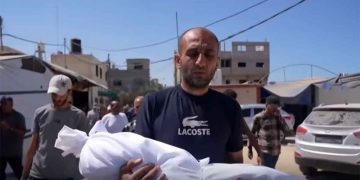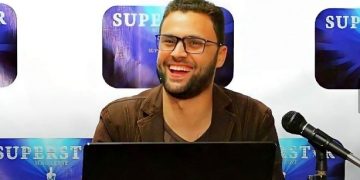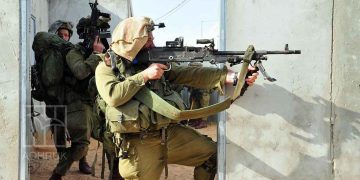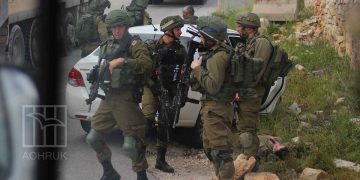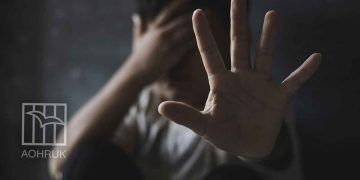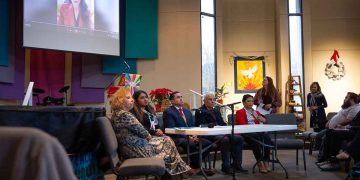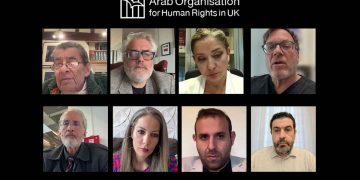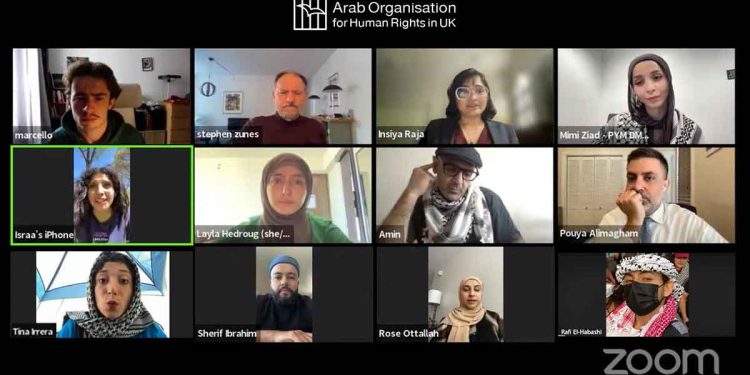On Tuesday, May 07, 2024, Arab Organisation for Human Rights in the UK (AOHR UK) hosted a significant webinar titled “Campus Solidarity: American Universities Rally Against Genocide in Gaza” to highlight the pivotal role of student protests in championing human rights, with a particular focus on recent movements against the genocide in Gaza.
This webinar delved into the challenges faced by student protesters globally, shedding light on responses to police crackdowns. The webinar also analysed the ethical demands of students, urging universities to reassess their investments and alliances in light of human rights violations.
In her contribution at the webinar “Campus Solidarity: American Universities Rally Against Genocide in Gaza,” Israa Alzamli, a student from Harvard, highlighted the severe repercussions faced by student protesters at her institution. She detailed an email from the university president threatening suspension and involuntary leave for those involved in the encampment protests, which would result in students losing their housing, insurance, and campus access. Alzamli pointed out the disciplined manner in which the Harvard protesters have conducted themselves, noting their adherence to not blocking pathways, observing quiet hours, and following directives from police and administration. Despite these efforts, she reported that the university administration has consistently refused to engage with the protesters, culminating in a sudden suspension order. Alzamli emphasised her role in supporting her fellow students and preparing for potential police intervention at the encampment.
Professor Stephen Zunes, a noted expert in International Security and Foreign Policy at the University of San Francisco, provided a historical perspective on the efficacy of divestment campaigns on college campuses during the webinar. Drawing parallels to the anti-apartheid movements of the late 1970s and 1980s, Zunes reflected on how students had built shantytowns on campuses to mirror the living conditions of Black South Africans and to protest investments in corporations active in apartheid South Africa. He highlighted the significant differences in administrative responses to campus protests then and now, noting that while past movements often allowed prolonged encampments, current protests face immediate and harsh crackdowns.
Zunes recounted his own experiences with arrests during more confrontational protests, such as occupying administrative buildings, contrasting them with today’s swift police actions against similar demonstrations. He also noted a concerning trend in the repression of student organisations like Students for Justice in Palestine and Jewish Voice for Peace, which face bans at several universities.
Emphasising the role of university communities in raising awareness about global injustices, Zunes encouraged students to remain committed to nonviolence and inclusivity, to counteract false claims of anti-Semitism vigilantly, and to clarify that their activism is rooted in a quest for justice. Through these actions, he stressed, students could uphold the educational institutions’ critical role in addressing pressing global issues.
Rafi El-Habashi, a member of the Pro-Palestinian Protests at Georgetown University, spoke about the coalition of students from eight universities in the DC, Maryland, Virginia area known as the TMBS JP Coalition, during the webinar. El-Habashi detailed the political repression and internal conflicts they have faced, along with instances of physical violence from university staff and police officers. Despite these challenges, their focus remains firmly on the situation in Gaza, particularly in light of recent escalations like the ground invasion of Rafa.
El-Habashi criticised the empty rhetoric of ceasefire calls, especially highlighting the contradiction at Georgetown University, where despite the university president advocating for a ceasefire, the university maintains substantial investments in corporations that support oppressive regimes. He argued forcefully for immediate divestment and the cessation of military aid, stressing that material pressure is the only viable strategy left to challenge and change the status quo.
He called for transparency in university endowments, divestment from all corporations complicit in genocide and broader systems of occupation and apartheid in Palestine, and a boycott of academic institutions that support these systems. El-Habashi concluded by affirming the necessity of the Boycott, Divestment, Sanctions (BDS) movement, drawing parallels to its effectiveness in ending apartheid in South Africa, to address the ongoing injustice and oppression in Palestine.
Dr. Pouya Alimagham, an American Historian and Lecturer at the Massachusetts Institute of Technology, shared a vivid account of recent tensions on MIT’s campus during the webinar. He described a critical confrontation involving the encampment of student and faculty protesters, which faced significant threats of dispersal by the administration and police. The situation escalated when access to the encampment was restricted, leading to a decrease in participant numbers due to heightened security measures, including ID checkpoints.
Despite the administration’s ultimatum that the encampment would be forcibly cleared, resulting in arrests and suspensions, the protesters adeptly managed their resources and staged a strategic resistance. Dr. Alimagham recounted how, in a turn of events that shifted from despair to victory, students and faculty not only safeguarded their supplies but also orchestrated a diversion by occupying a key building on campus. This maneuver effectively split the police forces and garnered substantial support as community members, including high school students, rallied to the cause, significantly bolstering the protesters’ numbers.
Highlighting the broader implications of their actions, Dr. Alimagham emphasised the collective struggle against injustices in the Gaza Strip and West Bank, framing the campus movements as part of a transnational frontline. His message underscored the importance of solidarity and resilience in the face of adversity.
Amin Husain, an adjunct faculty member at New York University and active participant in Pro-Palestinian protests, shared his experiences and insights during the webinar. Husain began by acknowledging the significant contributions of what he termed the “Student Intifada” to the broader struggle against ongoing injustices. He expressed solidarity with their resilience in the face of a longstanding genocide that continues to escalate.
Husain also shared his personal repercussions due to his activism, revealing that he was suspended from teaching at NYU since January, a move he described as tantamount to being fired but masked as a suspension to avoid public outcry. He underscored the severe measures taken against student movements in New York, including coordination between NYPD and FBI counterterrorism to suppress protests. These actions included the use of undercover officers, riot police, and tactics that severely curtail civil liberties, likening the response to counterinsurgency methods.
Furthermore, Husain criticised the increasing corporatisation of educational institutions, highlighting the disproportionate growth of administrative roles compared to academic positions, particularly at NYU where a significant majority of faculty are adjuncts. He argued that this business model affects the university’s policies and their alignment against student interests and educational values.
Leyla, a third-year student at Yale University, shared her experiences from recent student protests during the webinar. Inspired by similar movements, including Colombia’s encampment, Leyla was among 48 individuals arrested on April 22nd during a forceful removal by authorities from an encampment at Beinecke Plaza. This site had historical significance, previously used for protests against South African apartheid in 1986.
Leyla highlighted a disturbing aspect of the arrests, noting that Muslim and POC students were specifically targeted first, and treated differently compared to non-POC students, who received additional warnings before being arrested. She and her fellow protesters were charged with Class A misdemeanor and felony trespassing, the most severe charges under Connecticut law, with her court date looming the following day.
Despite these challenges, Leyla and her peers rebuilt the encampment a week later in a different campus location, though it only lasted a few days before administration threats forced its removal. She criticised Yale’s administration for using exaggerated reasons, such as “grass death” and supposed obstruction of pathways, to justify the encampment’s dismantlement, despite efforts to ensure accessibility.
Sherif Ibrahim, from Columbia University, spoke at the webinar, emphasising the broader context of the student movements against injustices in Palestine. He agreed with earlier sentiments expressed by another professor about the moral imperative to oppose genocide and the necessity of Palestine’s liberation. Ibrahim highlighted the significant financial stakes involved, noting that the combined endowments of the top universities exceed $500 million, underscoring the impact that collective divestment efforts could achieve.
Drawing from the intense experiences at Columbia, where 200 students faced arrests and disciplinary charges, with over 50 facing expedited expulsion proceedings, Ibrahim stressed the importance of strategic planning in protest activities. He advised that knowing when arrests can be leveraged to boost momentum and ensuring adequate resources for aftercare and legal support are crucial to sustaining effective activism.
Ibrahim also warned of the challenges in dealing with the media, advising careful selection of outlets to avoid misrepresentation and energy drain. He discussed the internal dynamics within activist coalitions, emphasising the need for clear political lines and education to navigate diverse ideologies ranging from anarchism to communism and liberalism. This clarity, he argued, is vital for maintaining unity and safety, especially in confrontations with law enforcement that could escalate to violence.
Marcelo, a participant from Sorbonne University in France, contributed to the webinar by drawing parallels between the challenges faced by student protesters in France and those in the United States. He highlighted a pervasive issue: the mischaracterization of student activists by government and university officials, who often label them as proponents of extremist views, specifically accusing them of supporting Hamas and dismissing their protests as minor disruptions.
Marcelo described the significant attention the student movements have garnered across France, with the public increasingly focused on the discourse around Palestine due to student-led occupations and blockades of campuses. Despite these efforts, when students at Sorbonne requested the university to cease collaborations with Israeli institutions in December, the administration responded by deflecting responsibility, claiming it was not their place to address such issues.
Furthermore, Marcelo noted the severe responses from the French authorities, where any speech perceived as supporting terrorism leads to arrests under accusations of supporting terrorism. This has escalated to police interventions to dismantle campus occupations swiftly. He reported that just last Friday, police actions were taken against occupations at 25 campuses across France, reflecting a widespread crackdown on student activism.
This situation in France, as Marcelo described, resonates with similar movements across Europe, including Italy, Belgium, Germany, England, and Switzerland, indicating a broader continental pattern of student mobilisation around issues of justice for Palestine. Marcelo’s account underscores the growing fear among authorities of these movements expanding further, highlighting the significant impact and potential of student activism in shaping public discourse and policy on international human rights issues.
Rose Ottallah, a Master’s student at the New School in New York, added her voice to the ongoing discussion during the webinar, focusing on the intense oppression faced by students in major cities such as New York, Harvard, and UCLA. She detailed her own experience with the encampment at the New School, which notably lasted for 12 uninterrupted days. Despite initial threats of suspension from the university administration aimed at silencing the students, Rose highlighted the substantial community support that emerged in response.
She pointed out a poignant irony in the situation at the New School, an institution founded on principles of social justice and originally established as a haven for scholars fleeing the Holocaust. The university’s historical commitment to dissent contrasts sharply with its current actions, which Rose criticised as a shift towards prioritising capital over its foundational values. She mentioned the stark difference between the progressive theories taught in classrooms and the practical disregard for these principles when it came to handling student protests.
Despite these challenges, Rose reported a unique aspect of their movement’s success. The New School provided partial disclosure about its operations within five days of the encampment’s start, a victory that alumni and faculty had sought for years without success. This outcome, she argued, validated the necessity of their protests, demonstrating that such direct actions are sometimes the only effective method to achieve meaningful change when traditional avenues fail.
Mimi Ziad, representing the Coalition in DC, Maryland, Virginia for Students for Justice in Palestine at George Washington University, shared her experiences from the front lines of the solidarity encampment during the webinar. She described the situation as a “roller coaster,” noting that while they have not faced the same level of physical violence seen in other encampments, the proximity to significant political and intelligence institutions has led to intense surveillance and intimidation.
Mimi highlighted an incident involving members of the House Committee on Oversight and Accountability, including Chairman James Corner and Representatives Lauren Boebert, Anna Paulina Luna, Byron Donalds, Eric Burlinson, and William Timmons, who visited the campus ostensibly to taunt and intimidate students. This visit underscored the planned oversight committee hearing concerning the encampment, signaling heightened governmental scrutiny.
Despite these challenges, Mimi emphasised the formidable response from the community, which rallied quickly and in large numbers to support the students when the encampment began. She pointed out the sustained community support, including setting up their own ad-hoc protections for students when police presence escalated and administration support waned.
Mimi’s narrative underscored the powerful solidarity and collective care within the community, elements she described as largely foreign to mainstream American understanding but intrinsic to Arab and Palestinian cultural practices. She criticised the university administration’s outright refusal to negotiate or engage in dialogue, marking a clear stance against the student movement and calling in police intervention as a measure to suppress the protest.
Ahmed, a student from the Boston area, discussed his involvement and observations of the solidarity encampments at various universities during the AOHR UK webinar. Without an encampment at his own university, Ahmed has been actively participating in support efforts at other institutions, including Northeastern, Emerson, Harvard, MIT, and Tufts.
He reported that Northeastern University had shut down their encampment and restricted access to Centennial Common by claiming it was reserved for private events, a tactic he viewed as an attempt to prevent further encampments. Ahmed shared a particularly distressing incident at Emerson, where a friend from Boston University was arrested and suffered a broken nose, highlighting the severe responses from authorities aiming to discourage student activism through harsh legal and physical measures.
Echoing sentiments from previous discussions at the webinar, Ahmed expressed a cautious optimism about the resilience of the encampment movements, describing them as “anti-fragile.” He explained that the more authorities attempt to suppress these protests, the more they seem to grow in strength and number. This resilience has further motivated students from across the Boston area to join and support the encampments, especially when they witness increased harassment or policing.
Ahmed’s hope is that continued student activism will lead to significant policy changes, specifically advocating for university divestments from technologies and corporations that support the Israeli military. His narrative highlighted a collective determination among students to persist in their activism despite facing considerable challenges, underlining the broader impact and potential of these movements to drive change within university policies and beyond.
Tina, who is not a student but actively involved in a prolonged encampment outside the residence of U.S. Secretary of State Anthony Blinken, detailed her reasons for protesting during the AOHR UK webinar. She has been part of this encampment since the end of February, marking over 100 days of continuous presence aimed at holding Secretary Blinken accountable for his role in U.S. foreign policy.
Tina emphasised that as Secretary of State, Blinken advises the President on foreign policy and oversees the transfer of U.S. weapons to ensure they are used in accordance with international law—a standard she argues is not being met. The encampment serves as a daily reminder to Blinken of the alleged misuse of U.S. weapons and the broader implications of U.S. foreign policy decisions, which Tina claims include support for the genocidal actions.
She accused Blinken of ignoring substantial evidence of human rights violations, including rape and torture, and of disregarding warnings from within his own administration about the imminent risk of famine and the necessity for an immediate ceasefire and unrestricted aid access to Gaza. Tina also highlighted Blinken’s recent activities, such as attending a conference in Arizona, as neglectful given the ongoing crisis.
The protest, according to Tina, focuses on demanding a permanent ceasefire and an end to U.S. weapons transfers to Israel, which she refers to as an “apartheid Zionist regime.” She articulated a strong stance against Blinken’s actions, asserting that he has been made aware of legal violations and yet continues to ignore them. This position forms the basis of their ongoing protest, which Tina vows to continue until their demands are met, reflecting a deep commitment to accountability and change in U.S. foreign policy.


